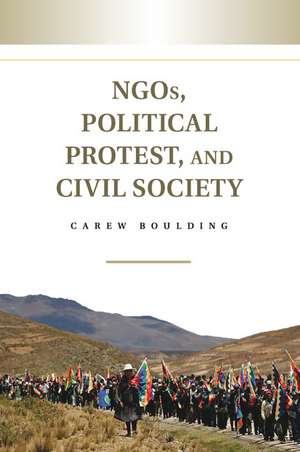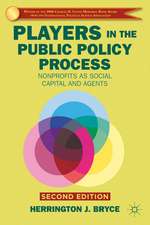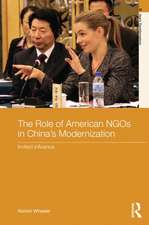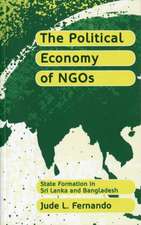NGOs, Political Protest, and Civil Society
Autor Carew Bouldingen Limba Engleză Paperback – 5 oct 2016
| Toate formatele și edițiile | Preț | Express |
|---|---|---|
| Paperback (1) | 283.25 lei 6-8 săpt. | |
| Cambridge University Press – 5 oct 2016 | 283.25 lei 6-8 săpt. | |
| Hardback (1) | 691.66 lei 6-8 săpt. | |
| Cambridge University Press – 22 iun 2014 | 691.66 lei 6-8 săpt. |
Preț: 283.25 lei
Nou
Puncte Express: 425
Preț estimativ în valută:
54.20€ • 56.00$ • 45.09£
54.20€ • 56.00$ • 45.09£
Carte tipărită la comandă
Livrare economică 19 martie-02 aprilie
Preluare comenzi: 021 569.72.76
Specificații
ISBN-13: 9781107659384
ISBN-10: 1107659388
Pagini: 232
Ilustrații: 27 tables
Dimensiuni: 152 x 229 x 13 mm
Greutate: 0.35 kg
Editura: Cambridge University Press
Colecția Cambridge University Press
Locul publicării:New York, United States
ISBN-10: 1107659388
Pagini: 232
Ilustrații: 27 tables
Dimensiuni: 152 x 229 x 13 mm
Greutate: 0.35 kg
Editura: Cambridge University Press
Colecția Cambridge University Press
Locul publicării:New York, United States
Cuprins
1. Introduction; 2. NGOs, mobilization, participation, and democracy; 3. Local NGO activity and its consequences in Bolivian municipalities; 4. NGOs, associations, protest, and voting in Latin America; 5. Associational activity and participation in developing democracies; 6. Civil society, protest, and attitudes toward democracy; 7. Conclusions: articulating democratic discontent.
Recenzii
'Recent literature on the resurgence of protest in Latin America may have inadvertently reinforced the divide between protest politics and electoral politics. Boulding's first-rate analysis of NGOs' protest activity suggests that this divide is fluid rather than fixed. Her study makes an important contribution to the existing literature by explaining how the political context conditions the influence of NGO activity, and how this context, in turn, encourages NGOs to promote protests in some cases and voting in others. Boulding's study also provides a solid foundation about the effects of protest on new democracies, showing that protests are not always incompatible with the workings of young democracies. The methodological sophistication of her analysis is outstanding and well executed. Overall, Boulding has left a footprint on the contentious and comparative politics literatures.' Moises Arce, University of Missouri
'Methodologically, there is finally a book for those pesky graduate students always asking for examples of 'mixed methods' works that complement sophisticated quantitative analysis with causal path-defining field research. Substantively, after a decade of studies telling us that civil society and social capital 'matter' but not how, Carew Boulding's provocative work offers important theoretical and empirical contributions. Her conclusions, that civil society protest may not be as much of a problem for democracy - even in highly mobilized polities like Bolivia - as a lack of faith in elections, offer new and vital insights. The book is original, crisply written, and extremely clever in how it teases important interpretations out of apparently innocuous data. It will be of great interest to scholars of democratization, development, social movements, political institutions and Latin American politics, as well as anyone interested in mixing methods, maximizing their field research and explicitly addressing underspecified but real tensions between democracy and participation.' Todd Eisenstadt, American University, Washington DC
'Boulding has written an impressive and important book that offers a new way of understanding the role NGOs play in promoting political participation and political stability in young democracies. It weaves together rich empirical evidence from Bolivia, Latin America, and cross-national surveys to show that protests need not undermine weak democracies, but can strengthen them by giving citizens meaningful ways to express their grievances. This emphasis on contentious politics will energize a literature that tends to focus narrowly on voting and electoral politics.' Claudio A. Holzner, University of Utah
'From Tocqueville to Huntington to Putnam, civil society's role in supporting democracy has been debated. In an impressive debut, Carew Boulding marshals a dazzling array of data ranging from the sub-national level in Bolivia to cross-national surveys to show that NGOs facilitate both voting and protest because, fundamentally, they facilitate citizen collective action to hold leaders accountable. Her book transforms the terrain for future scholarship on civil society.' Irfan Nooruddin, Georgetown University, Washington DC
'Methodologically, there is finally a book for those pesky graduate students always asking for examples of 'mixed methods' works that complement sophisticated quantitative analysis with causal path-defining field research. Substantively, after a decade of studies telling us that civil society and social capital 'matter' but not how, Carew Boulding's provocative work offers important theoretical and empirical contributions. Her conclusions, that civil society protest may not be as much of a problem for democracy - even in highly mobilized polities like Bolivia - as a lack of faith in elections, offer new and vital insights. The book is original, crisply written, and extremely clever in how it teases important interpretations out of apparently innocuous data. It will be of great interest to scholars of democratization, development, social movements, political institutions and Latin American politics, as well as anyone interested in mixing methods, maximizing their field research and explicitly addressing underspecified but real tensions between democracy and participation.' Todd Eisenstadt, American University, Washington DC
'Boulding has written an impressive and important book that offers a new way of understanding the role NGOs play in promoting political participation and political stability in young democracies. It weaves together rich empirical evidence from Bolivia, Latin America, and cross-national surveys to show that protests need not undermine weak democracies, but can strengthen them by giving citizens meaningful ways to express their grievances. This emphasis on contentious politics will energize a literature that tends to focus narrowly on voting and electoral politics.' Claudio A. Holzner, University of Utah
'From Tocqueville to Huntington to Putnam, civil society's role in supporting democracy has been debated. In an impressive debut, Carew Boulding marshals a dazzling array of data ranging from the sub-national level in Bolivia to cross-national surveys to show that NGOs facilitate both voting and protest because, fundamentally, they facilitate citizen collective action to hold leaders accountable. Her book transforms the terrain for future scholarship on civil society.' Irfan Nooruddin, Georgetown University, Washington DC
Notă biografică
Descriere
This book shows how non-governmental organizations in the developing world change how people participate in politics.














